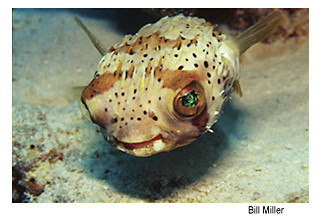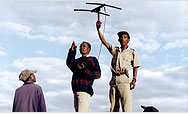Coral Reefs Are Critical for Food Security, Economic Development and Biodiversity Conservation
 |
| This balloon fish prefers coral reef habitats. |
Coral reef and associated mangrove forests play a critical but often undervalued role in the sustainable development options for millions of coastal residents throughout the world. Coastal protection from waves and storm surge, significant food security, recreation, and tourism are but a few of the many ecological services provided by coral reef ecosystems. The most complex ecosystem in the ocean, reefs are renowned for their biodiversity, sheltering more than 800 species of reef-building corals, thousands of species of fish, and millions of other species. The beauty and diversity of coral reefs contribute to one of the fastest growing sectors of the global economy—coastal tourism. An estimated one billion people in Southeast Asia, and millions in other regions, depend upon reefs as their major source of protein; millions of others depend upon reefs for their livelihoods. However, these precious reef resources are becoming increasingly vulnerable to a combination of direct human impacts and the effects of global climate change.
Global Trends and Emerging Solutions
Multiple human activities—including poorly planned or sited coastal development, destructive fishing, overharvesting, and the runoff of sediments and nutrients—have caused the loss of over 25 percent of the world’s coral reefs, and severely threaten close to 60 percent of the remaining reefs. Loss of mangrove forests and seagrass meadows, which are ecologically connected to coral reefs, poses significant threats to these systems. International trade in coral reef animals for the curio, marine aquarium, and food trades is increasing and driving overexploitation and destructive fishing practices, such as the use of cyanide. More recently, elevated sea surface temperature has caused coral “bleaching” and mortality of significant portions of reefs in all regions and seas.
Urgent management actions are needed to reduce stresses to coral reef and coastal ecosystems, preserve the valuable goods and services they provide, and conserve their unique biodiversity. Conservation and sustainable use of reefs may also prevent poverty and loss of well-being among those communities dependent upon reef resources.
Role of Governance in Coral Reef and Coastal Management
Successful coral reef and coastal management requires long-term commitment to integrated coastal management (ICM), marine protected areas (MPAs), and the process of establishing effective governance by coastal residents and nations over their coastal resources. The ultimate objective is to achieve meaningful “co-management” of the resource, whereby governments, individuals, and the private sector, acting through their communities, collaborate on the identification of priority needs and the design and implementation of successful management solutions. When such integrated and participatory planning is undertaken at the ecosystem scale, chances are dramatically improved that individual behavior and decisions concerning future development will unfold based on principles of resource stewardship. Effective ICM and MPA processes are critical, but so are the development and adoption of relevant policy, legal, and institutional tools, and an investment in monitoring and evaluation to provide feedback and sound scientific information to guide future action.
Role of Ecological No-take Reserves and Networks of Marine Protected Areas
The establishment of ecological “no-take” reserves and/or multi-purpose marine protected areas can result in early and sustained management dividends. Ecological reserves improve fishery yields and help build and maintain healthy fish populations that, in turn, are integral to the health of coral reef ecosystems. Ecological reserves have proven very effective in the conservation of marine biodiversity and the generation of jobs and revenue through tourism. Establishing networks of marine protected areas is critical for maintaining resource productivity, enhancing resiliency, and ensuring the protection of marine and coastal habitats. Such tools, when coupled with ongoing education, enforcement, and income-generation schemes, offer the best hope for reducing or eliminating stress on coral reefs, increasing the odds that they can withstand the next bleaching event.
USAID Coral Reef Activities
Through public and private partners, USAID supports coral reef and mangrove forest conservation activities in over 25 countries. Activities aim to:
- Reduce land-based sources of pollution
- Address overfishing, destructive fishing, and adverse trade impacts
- Promote sustainable tourism, including “green” and fair tourism
- Address coral bleaching and coral diseases
- Promote environmental awareness and stewardship
USAID activities support the efforts of the U.S. Coral Reef Task Force and international efforts, such as the International Coral Reef Initiative, the Global Program of Action for the Control of Land-Based Sources of Marine Pollution, and the Convention on the International Trade of Endangered Species (CITES).
Illustrative Activities
The Global Conservation Program is a partnership with six U.S.-based conservation organizations to address the most pressing threats to species-rich land and seascapes around the world. Coral reef projects include the: Eastern Africa Marine Ecoregion in Kenya, Tanzania, and Mozambique; Glover’s Reef Seascape in Belize; Meso-American Reef in Mexico, Belize, Guatemala, and Honduras; Wakatobi National Park and Raja Ampat Islands in Indonesia; and Kimbe Bay in Papua New Guinea.
The Parks in Peril Program strengthens protected area management in Latin America and the Caribbean through ecoregional and site-based approaches, such as protecting critical spawning aggregation sites, creating no-take reserves, and promoting co-management and sustainable financing schemes.
The PROARCA/APM regional program in Central America is strengthening regional and transboundary management of coastal and watershed resources in the Gulf of Honduras along the Guatemala/Belize/Honduras borders, the Miskito Coast of Honduras and Nicaragua, and the Amistad Cahuita Rio Canas area of Panama and Costa Rica.
Meso-American Reef Alliance is promoting economically and environmentally sound management of the reef and the strategic engagement of the private sector, including agribusinesses, fisheries, and tourism.
Fisheries Improved for Sustainable Harvest (FISH) is working with the Government of the Philippines and local communities to implement sound fisheries governance, adopt an ecosystem-based approach to fisheries management, address illegal fishing, promote rule of law, improve access to family planning, and reduce conflicts and terrorism.
Back to Top ^


